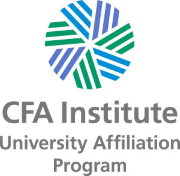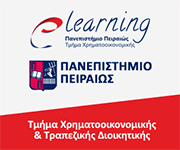Financial Accounting (2018-19)
Course Name: Financial Accounting
Teacher: —
School: Finance and Statistics
Department: Banking and Financial Management
Level: Undergraduate
Course ID: — Semester: 2nd
Course Type: Core Course
Prerequisites: –
Teaching and Exams Language: Greek
Course Availability to Erasmus Students: No
Course webpage: –
Specific Teaching Activities |
Weekly Teaching Hours |
Credit Units |
Lectures |
4 |
6 |
Course Content
– Institutional Framework and basic accounting concepts of financial accounting in accordance with within International Financial Reporting Standards (IFRS).
– The Statement of financial position – balance sheet.
– The Statement of comprehensive income, the profit and loss statement, the statement of changes in equity, notes to financial statement.
– The function of the accounting cycle in detail, the main accounting records (journal, general ledger).
– Analysis of basic accounting events and of their consequences on the accounting equation, recording of journal, adjusting, and closing entries, T accounts, preparation of trial balances.
– Accounting for depreciation.
– Introduction to accounting for inventory.
– Introduction to accounting for doubtful receivables.
Teaching Results
The purpose of this module is to introduce students to the basic concepts and principles of financial accounting in detail (preparation of basic financial statements, accounting cycle, double entry bookkeeping, depreciation, inventories, doubtful receivables). Relevant concepts are presented in accordance with International Financial Reporting Standards – IFRS.
At the end of the semester the students should be able to:
– Understand basic accounting concepts and principles and prepare simple forms of financial statements by applying the International Financial Reporting Standards (IFRS) [statement of comprehensive income, statement of changes in equity, statement of financial position – balance sheet, notes].
– Understand the function of the accounting cycle and the use of the main accounting records (journal, general ledger).
– Analyse basic accounting events and their consequences on the accounting equation, record journal, adjusting, and closing entries, and prepare trial balances.
– Be in possession of a basic understanding of the methods used when accounting for depreciation, inventory and doubtful accounts receivable.
Skills
– Search, analysis and synthesis of financial data and relevant information.
– Critical thinking on scientific topics related to the content of the module relevant decision-making.
– Development of analytical and synthetic thinking.
– Working in an international environment, understanding the challenges of applying accounting rules in an international environment.
– Working in a multidisciplinary environment, collaborating with scholars of closely related scientific fields.
– Production of deductive thinking and critical reasoning.
Teaching and Learning Methods - Evaluation
Lecture: Ιn Class
Use of Information and Communication Technologies: Use of PowerPoint, e learning platform Eclass
Teaching Analysis:
Activity |
Semester Workload |
Lectures |
52 |
Study |
98 |
Total |
150 |
Student Evaluation:
Compulsory written exam at the end of the semester. This involves providing answers to exercises and problems, using numerical data, and a critical evaluation and discussion of the results, and also possible answers to multiple choice questions and theoretical questions.
Recommended Bibliography
-Module slides and exercises/cases studies covered in class
– Miller-Nobles, T., Mattison, B., Matsumura, E.M. (2017), Horngren’s Financial and Managerial Accounting, 6E, Pearson Education, Greek edition: Broken Hill Publishers.
– Needles, B.E., Powers, M., Crosson, S.V. (2016). Principles of Accounting, 12E, Cengage Learning, Greek edition:Broken Hill Publishers.
Relevant literature:
– Alexander/Britton/Jorissen/Hoogendoorn/van Mourik (2017), International Financial Reporting and Analysis, 7th Edition, Cengage Learning.
– Harrison/Horngren/Thomas (2017), Financial Accounting, 10E/11E, Pearson.
– Stolowy/Ding (2015), Financial Accounting and Reporting – A global perspective, 5th Edition, Cengage Learning.




